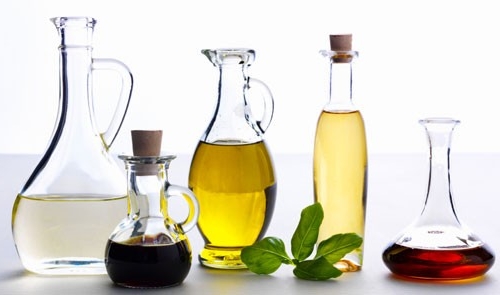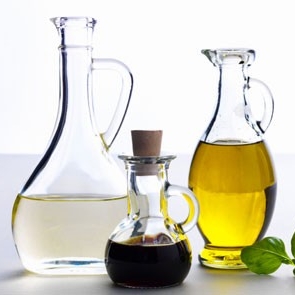Okay. It’s not really a lie. But it’s a huge misconception that the public seems to cherish as truth, and one which is passively, gladly enabled by the processed food industry which uses it universally on packaging and in commercials. Is it just a clever marketing mind game or cruel, profit-motivated cynicism?
 Liquid fats – Oils – are generally better for you than solid ones…
Liquid fats – Oils – are generally better for you than solid ones…
I’ve railed, here and in other forums, about cynical – sometimes downright deceptive – marketing techniques employed by manufacturers in many industries, including the food sector. Classics include the Meat Department scam, packaging ‘bargain’ meat cuts with excess skin and fat left on, concealed under the product, to bump up the weight. That literally means that you throw away some or all of your savings on the ‘special’ when you remove the ‘dead weight’.
Closer to today’s post topic, there’s the recently amped-up practice of offering ‘convenient’ pre-trimmed produce at ridiculously high mark-ups over over the prices of non-trimmed equivalents – sometimes doubling or tripling the price. It can be as simple as cutting the stem off of a head of Broccoli and calling it a ‘crown’ instead of a ‘head’. Sell it for $2.99 lb. / $6.59 while right next to it there are bunches of two or three heads, stems still on, selling for $2.99 per bunch. How much is ‘convenience’ worth to you?
Low Fat does not equal Low Calorie
Now, it seems, there’s a serious and broad-based public misperception that ‘Low Fat’ means ‘Low Calorie’, a mindset that University of Toronto investigators have concluded is causing more and more north Americans to eat more than they should in the mistaken belief that Fat = Calories. And food processing manufacturers are taking every opportunity to claim that their products are ‘Low in Fat’, as a marketing message.
The National Post quotes the report, appearing in the learned journal Appetite, as warning that, “fat claims may be misleading consumers and undermining their efforts to manage body weight or prevent obesity.”
Cornell University researchers, meanwhile, report that when many consumers see the message ‘Low in Fat’ on a product label, they assume it’s also lower in calories and make the false assumption that they can eat more without guilt or negative consequences.
Do yourself a favour…
If you really do read the nutrition labeling on packaged foods and know how to interpret it, you’ll quickly realize that many packaged foods have far more calories in sugars and other additives than any amount of fat in the formula would deliver. And excess calories will scuttle your healthy eating program faster than any other nutrition mistake!
If you really want to do yourself, and your heart in particular, a dietary favour with respect to Fats, switch as much as possible from ‘bad’ Tats to ‘good’ ones. That is, stay away from saturated Fats and go for unsaturated or mono-saturated Fats Olive Oil, Canola Oil and other more exotic Oils such as Peanut, Sesame, Sunflower and Safflower. As a general rule, liquid Fats (Oils) are better for you than solid Fats (Suet, Lard, Butter). By the same token, vegetable-derived fats are generally better for you than animal-sourced fats.
Yup. It’s really as simple as eating healthy Fats. But remember that you need some Fats in your diet to stay healthy. And don’t give up yummy things like Bacon Fat and Butter altogether: Just observe the rule that all good things should be enjoyed in moderation!
~ Maggie J.

